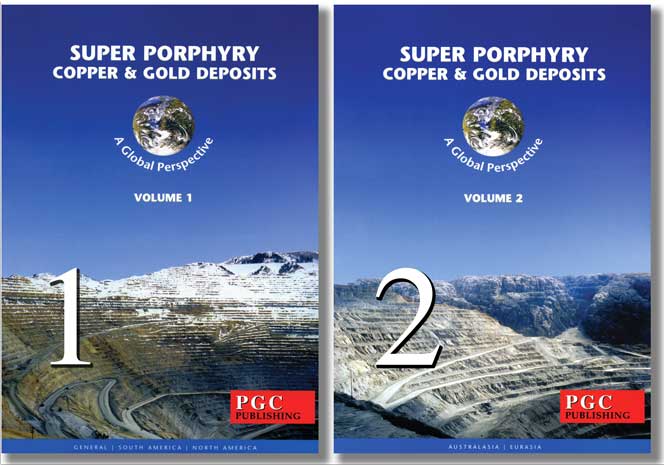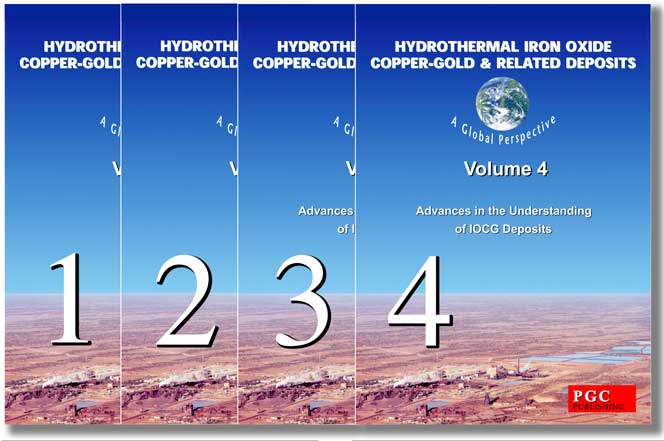|
Geita |
|
|
Tanzania |
| Main commodities:
Au
|
|
 |
|
 |
 |
Super Porphyry Cu and Au


|
IOCG Deposits - 70 papers

|
All papers now Open Access.
Available as Full Text for direct download or on request. |
|
 |
The Geita gold project is located in central northern Tanzania, some 90 km to the -west of the Lake Victoria coastal town of Mwanza. It also lies within the Geita Greenstone Belt, the northern arm of the regional Sukumaland Greenstone Belt of the Archaean Tanzanian Craton, which has a similar setting and a comparable sequence to that described at Golden Pride (see above). The Sukumaland Greenstone Belt comprises two intermittent roughly oval shaped domes with outer radii of from 80 to 140 km. The core is composed of the Lower Nyanzian mafic volcanics and sediments (see the Golden Pride description for more detail) and hosts the Bulyanhulu deposit (see above). The peripheries of the domes are dominated by the Upper Series of the Nyanzian (see the Golden Pride description for more detail) made up of BIF and intermediate and felsic volcanics. The Geita deposits are within the Upper Series. The western section of the belt, in the Geita area, is cut by regional scale Proterozoic quartz-gabbro dykes with a strong north-east trend. The area is dominated by both NW and NE structural trends, with a weaker NNW trend occupied by Karoo dolerite dykes. The greenstone belts of the Tanzanian Craton are not characterised by major regional structures as is the case in the Yilgarn and Superior Cratons, but by more localised and discontinuous structures.
Mineralisation in the belt is present in a number of forms, including i). BIF associated ores (both near the contact with felsic pyroclastics or intrusives, and in the main body of the BIF sequence), ii). mineralisation in footwall of hangingwall felsic tuffs, iii). shear hosted mineralisation in Lower Nyanzian mafic volcanics, or as volcanogenic massive sulphides (pyrite), or iv). ferricrete enrichments over bedrock mineralisation or from erosion of the BIFs.
Historically the Geita mine has operated from earlier in the 20th century, having produced just under 30 t (0.94 Moz) of gold from 5.5 Mt of ore between 1936 and 1966. In early April 2000 the previous manager Ashanti Goldfields, was joined by AngloGold and the project is now a 50:50 joint venture. The combined project has a resource of the order of 430 t (14 Moz) of contained gold with open pit grades averaging around 3.5 g/t Au. Reserves have been drilled below the open pit limits where higher grade intersections of more than 10 m @10 g/t have been encountered and the ore deposits are not closed. Production from the new Geita operation is expected to commence in late 2000.
The Geita Project now revolves around a series of deposits which includes the i). Geita Hill and adjacent Lone Cone deposits from which the historical production was derived, ii). Nyankanga immediately to the SW, iii). the Kukuluma Hill and Matandani deposits 9 km to the NE of Geita and iv). Nyamulilima Hill some 15 km to the WSW of Geita. All of these deposits are associated with BIF rich units with intercalated andesite and felsic tuff. They occur in complex transgressive sheared zones, which at Geita and Nyankanga strike ENE and dip at 30 to 55 degrees to the north. At Kukuluma the host sequence comprises a NE dipping footwall argillaceous sequence passing up into a finely bedded, 100 to 150 m thick BIF-chert unit which is overlain in turn by felsic tuffs. Gold lies within two parallel shears which follow steeply dipping axial fold and limb structures, with mineralisation preferentially developed in the BIF-chert units. At the Geita deposit economic gold s found in the oxide, transition and primary sulphide intervals.
The most recent source geological information used to prepare this decription was dated: 2001.
This description is a summary from published sources, the chief of which are listed below.
© Copyright Porter GeoConsultancy Pty Ltd. Unauthorised copying, reproduction, storage or dissemination prohibited.
Geita
|
|
|
|
|
Anonymous 2000 - Joint Announcement by Anglogold and Ashanti - Ashanti to Sell a 50% Interest in Geita to Anglogold: in Press Release 9p
|
Anonymous 1999 - Geita: in Register of African Gold 1999/2000 185-186
|
Ashanti Goldfields 1999 - The Geita Project (includes colour pages): in www.ashantigold.com/geita.htm and /geita1.htm-/geita7.htm 19p
|
Borg G 1994 - The Geita Gold Deposit in NW Tanzania - Geology, Ore Petrology, Geochemistry and Timing of Events: in Geologisches Jahrbuch D100 pp 545-595
|
Cowley P N 2001 - The discovery and development of the Geita gold deposits, northern Tanzania: in Yates K (Ed.), 2001 NewGenGold 2001, Conference Proceedings AMF, Adelaide pp 123-135
|
Foster R P 1999 - Destination Africa: New Frontiers, New Mineral Exploration Opportunities: in African Mining: Exploration and Investment Opportunities Conference, Perth, Australia: 16-17 November, 1999 AJM, Sydney pp 1-11
|
Henckel, J., Poulsen, K.H., Sharp, T. and Spora, P., 2016 - Lake Victoria Goldfields: in Episodes, v.39, pp. 135-154
|
Hester B W 1989 - Gold Mining in Tanzania: in Gold Forum on Technology and Practices; World Gold 89; First Joint International Meeting Between SME & AusIMM Soc Min., Metall., & Explor., Littleton, CO, US pp 104-110
|
Sanislav, I.V., Brayshaw, M., Kolling, S.L. Dirks, P.H.G.M., Cook, Y.A. and Blenkinsop, T.G., 2017 - The structural history and mineralization controls of the world-class Geita Hill gold deposit, Geita Greenstone Belt, Tanzania: in Mineralium Deposita v.52, pp. 257–279.
|
Walraven F, Pape J, Borg G 1994 - Implications of Pb-isotopic Compositions at the Geita Gold Deposit, Sukumaland Greenstone Belt, Tanzania: in J. of African Earth Sciences v18, no. 2 pp 111-121
|
|
Porter GeoConsultancy Pty Ltd (PorterGeo) provides access to this database at no charge. It is largely based on scientific papers and reports in the public domain, and was current when the sources consulted were published. While PorterGeo endeavour to ensure the information was accurate at the time of compilation and subsequent updating, PorterGeo, its employees and servants: i). do not warrant, or make any representation regarding the use, or results of the use of the information contained herein as to its correctness, accuracy, currency, or otherwise; and ii). expressly disclaim all liability or responsibility to any person using the information or conclusions contained herein.
|
Top | Search Again | PGC Home | Terms & Conditions
|
|